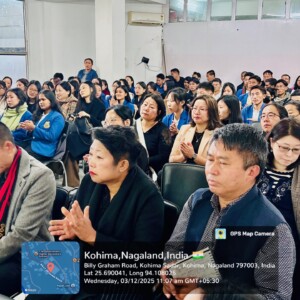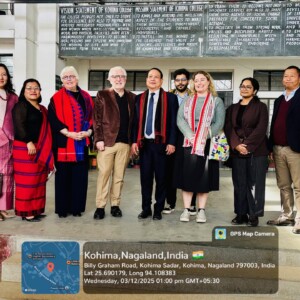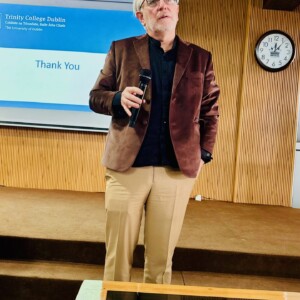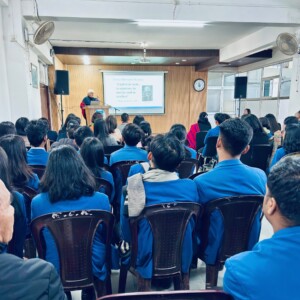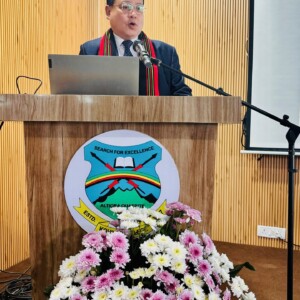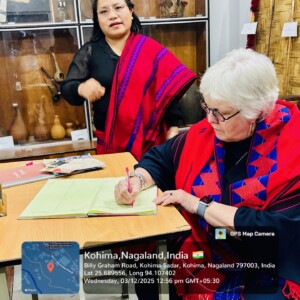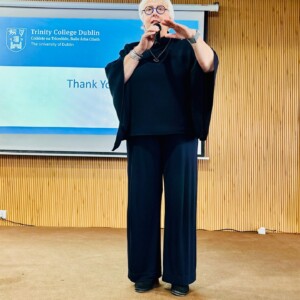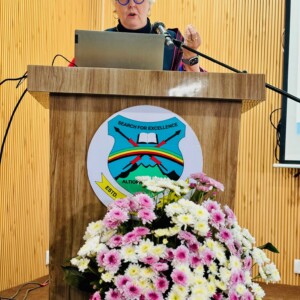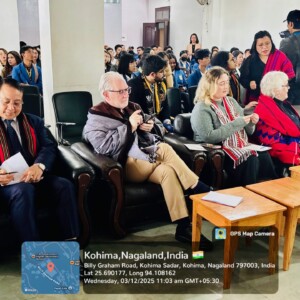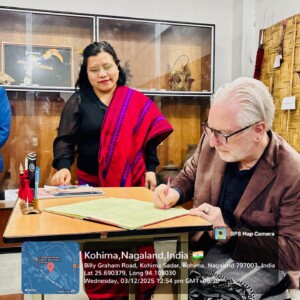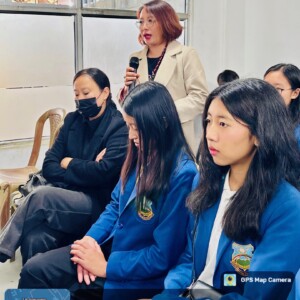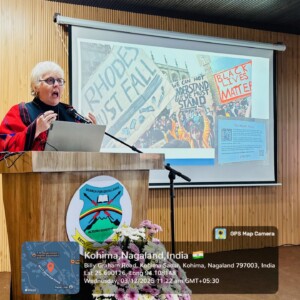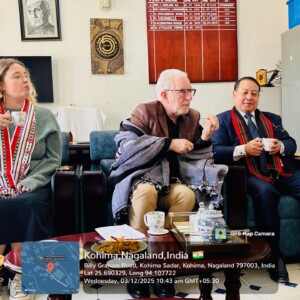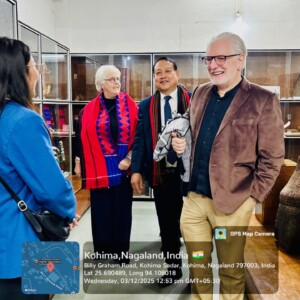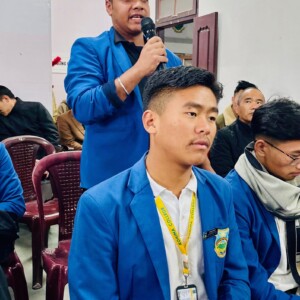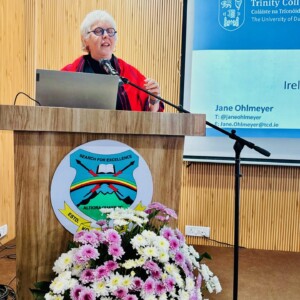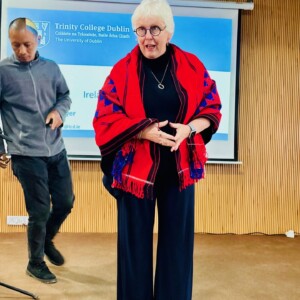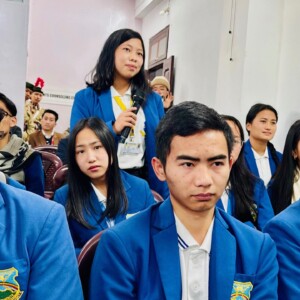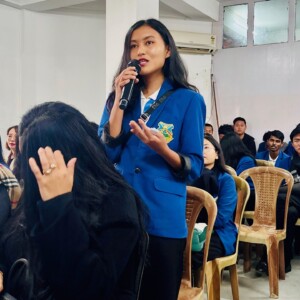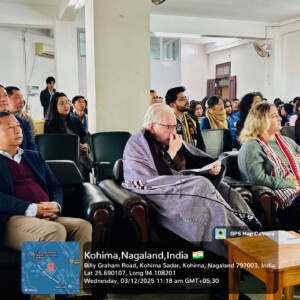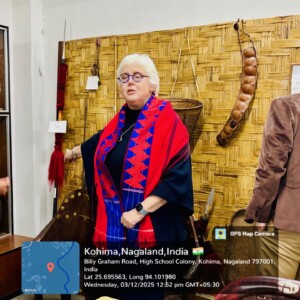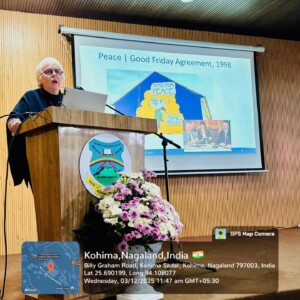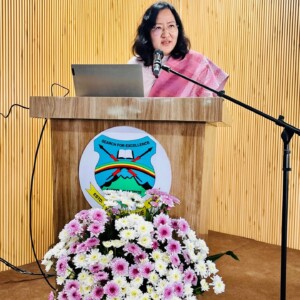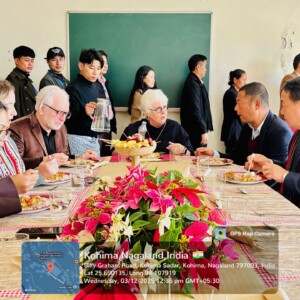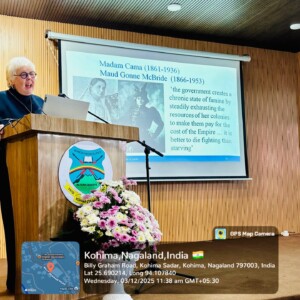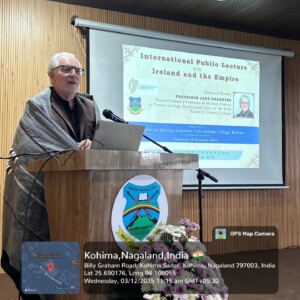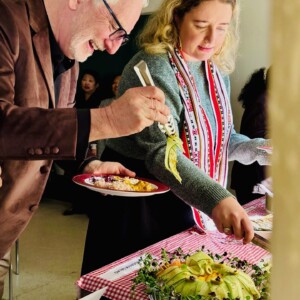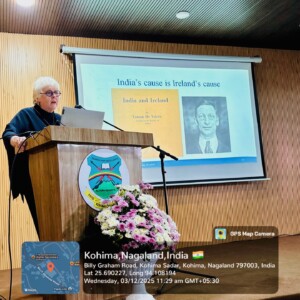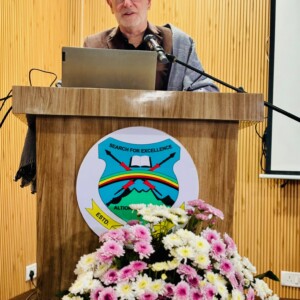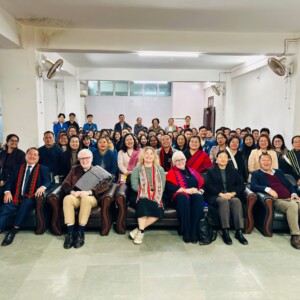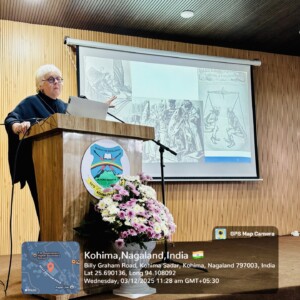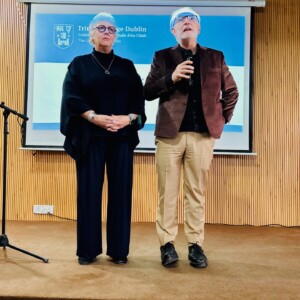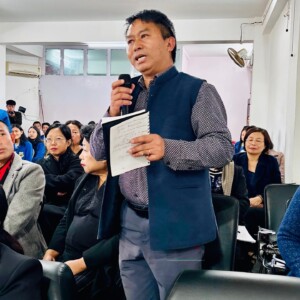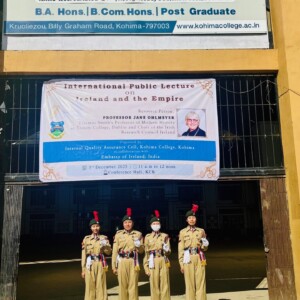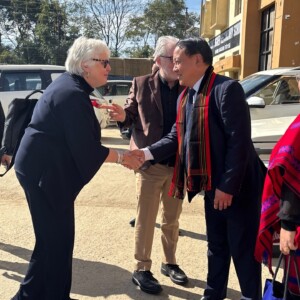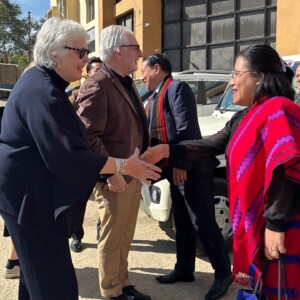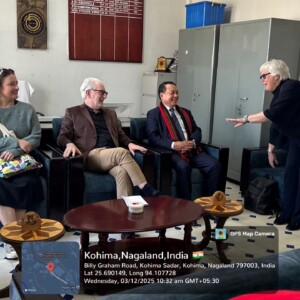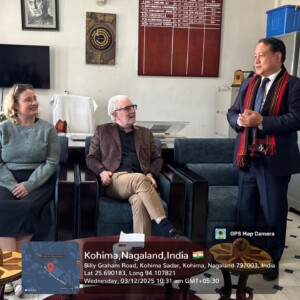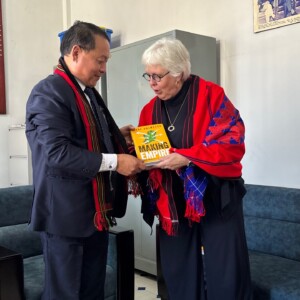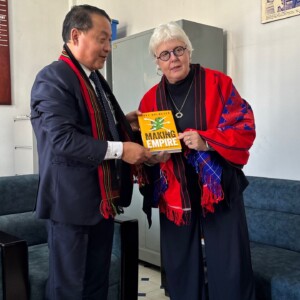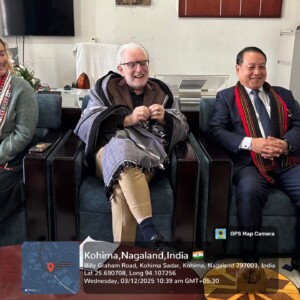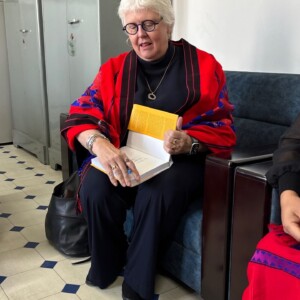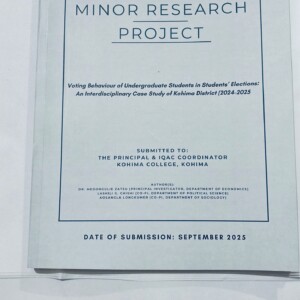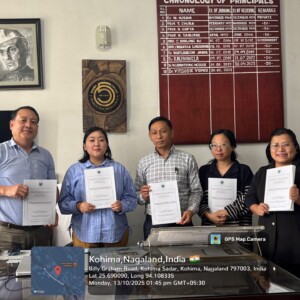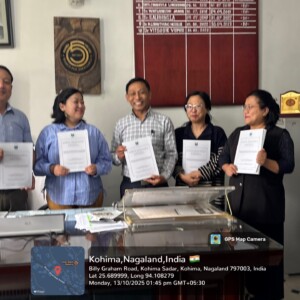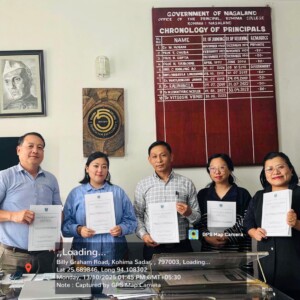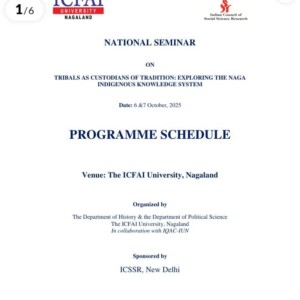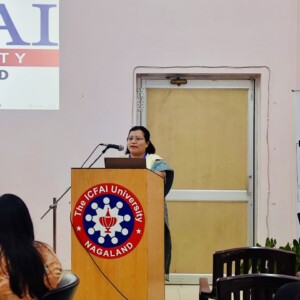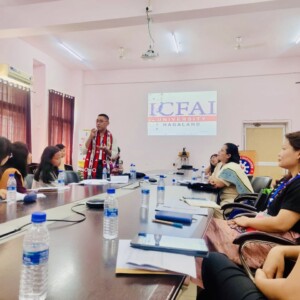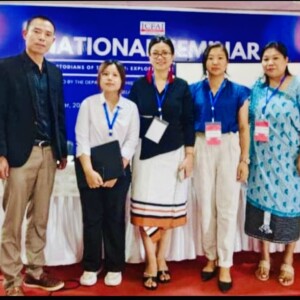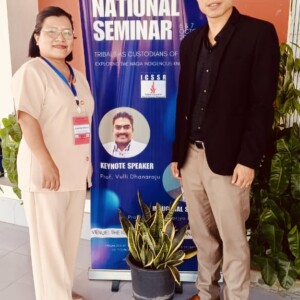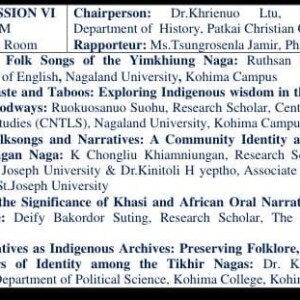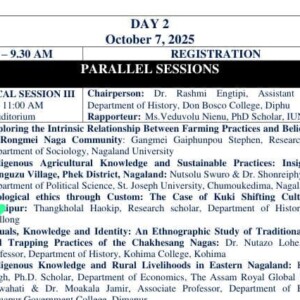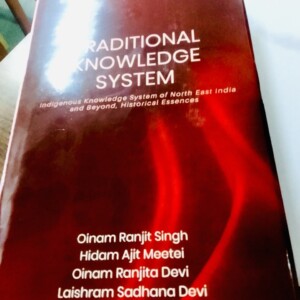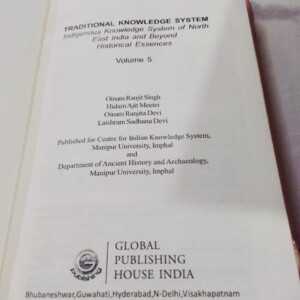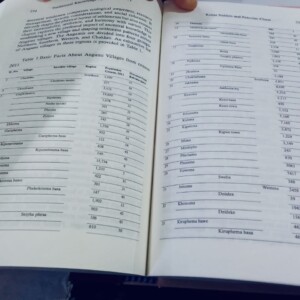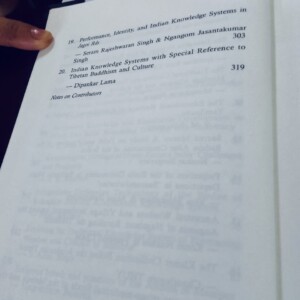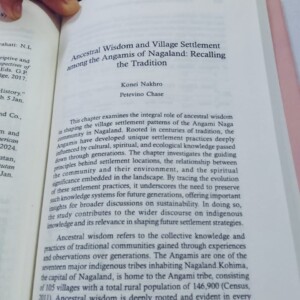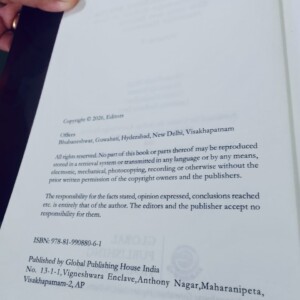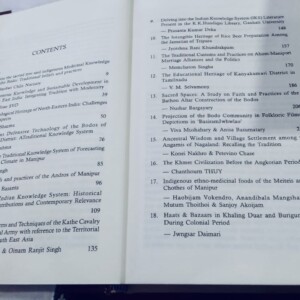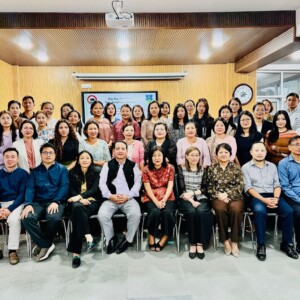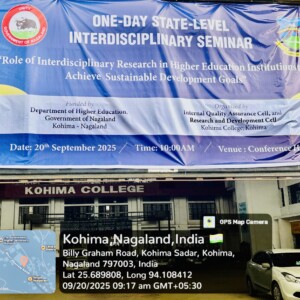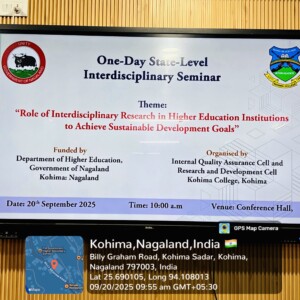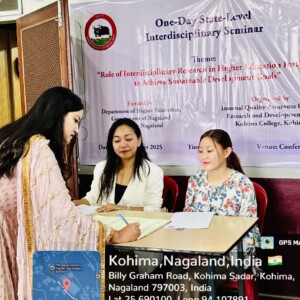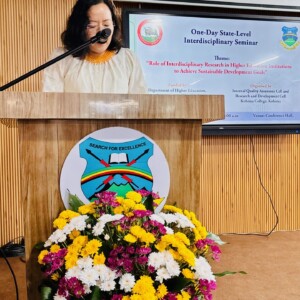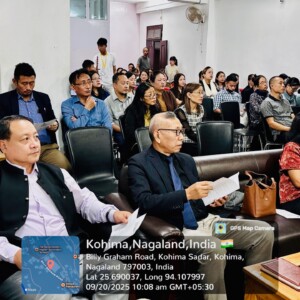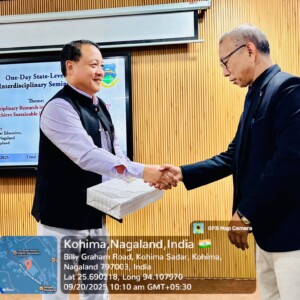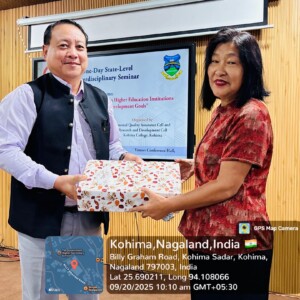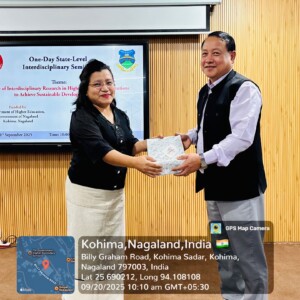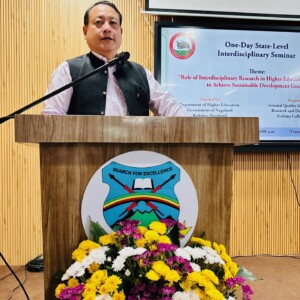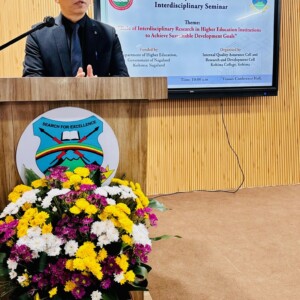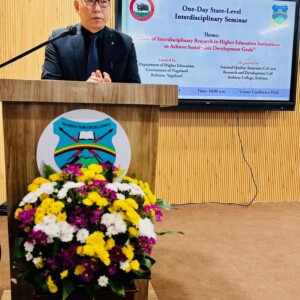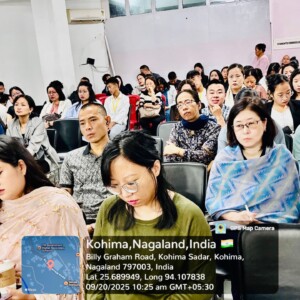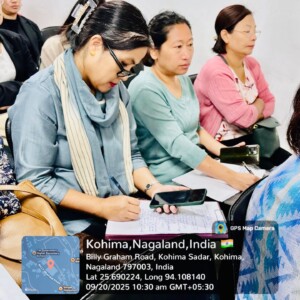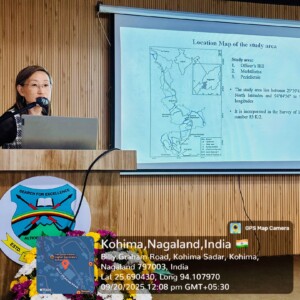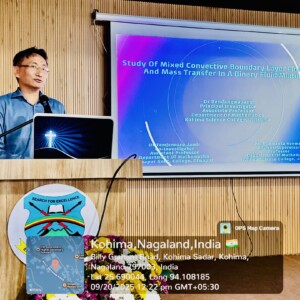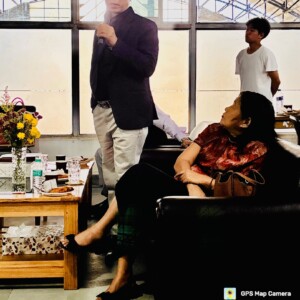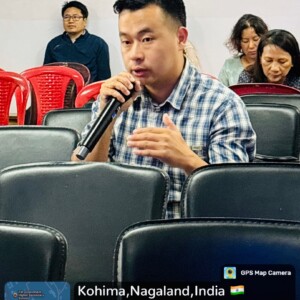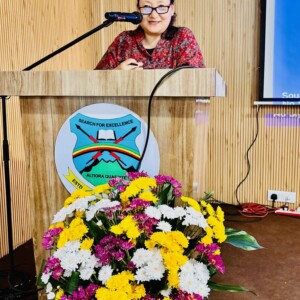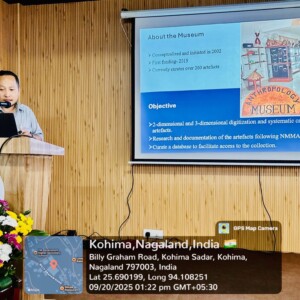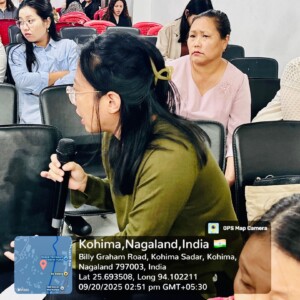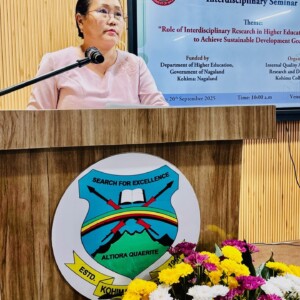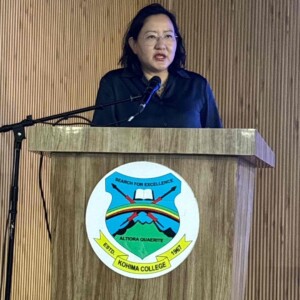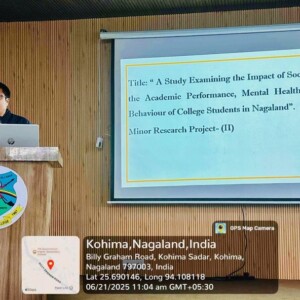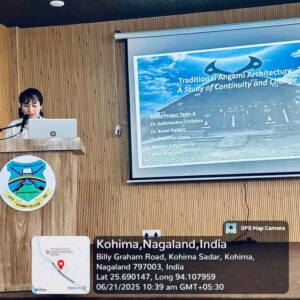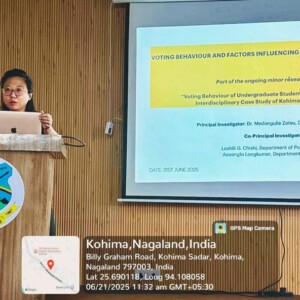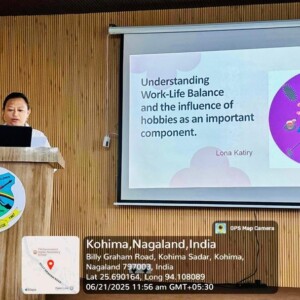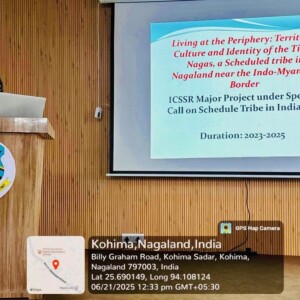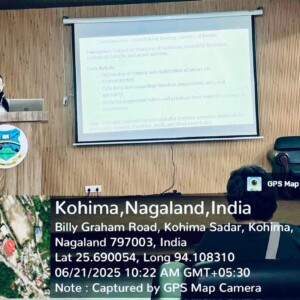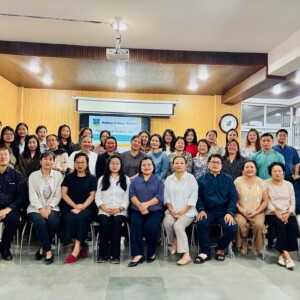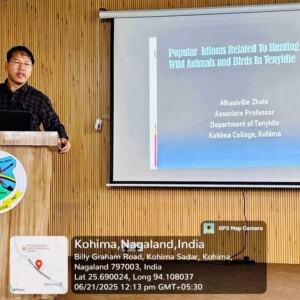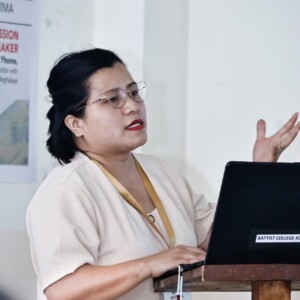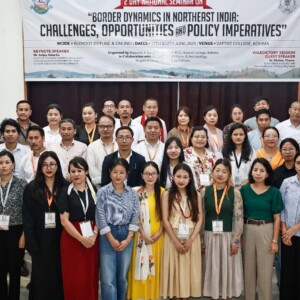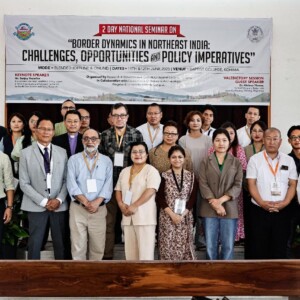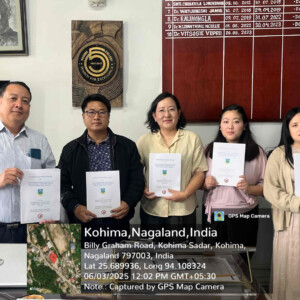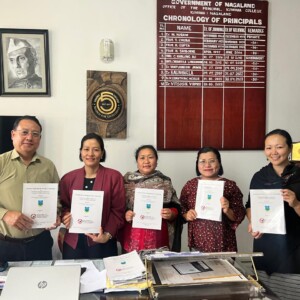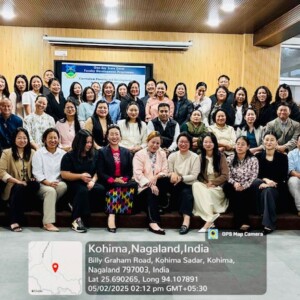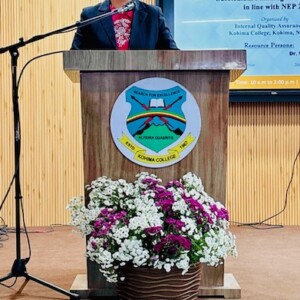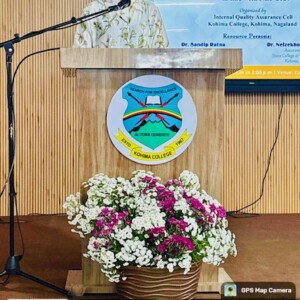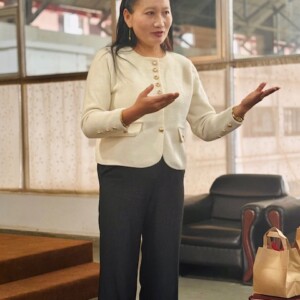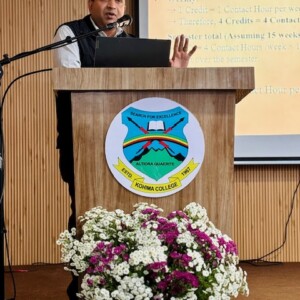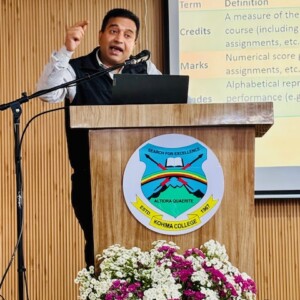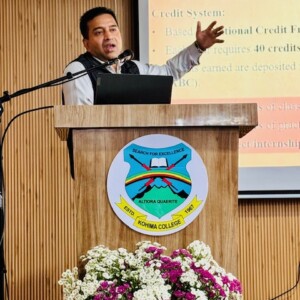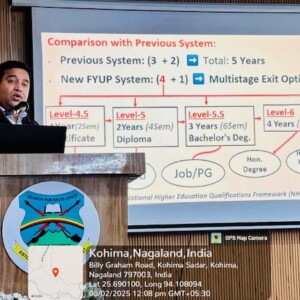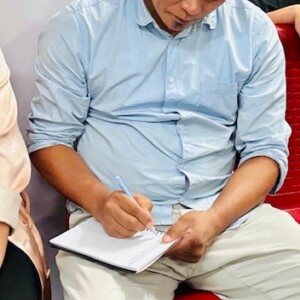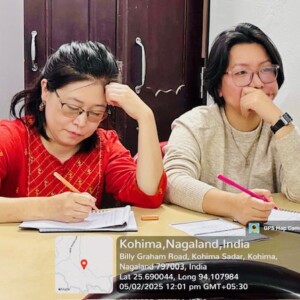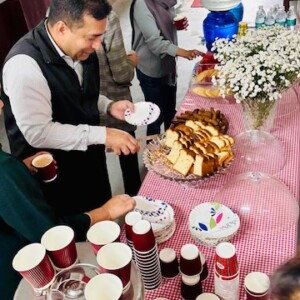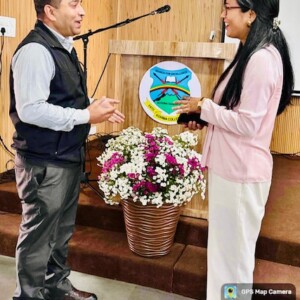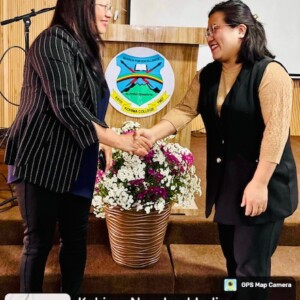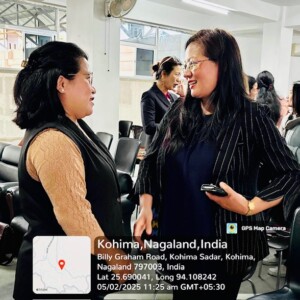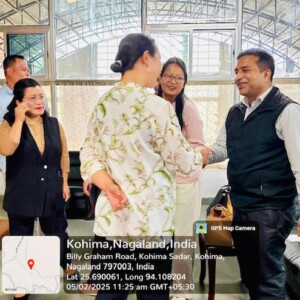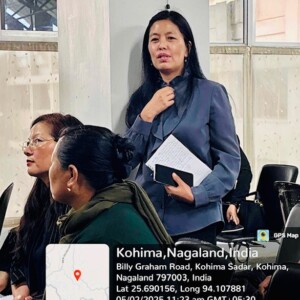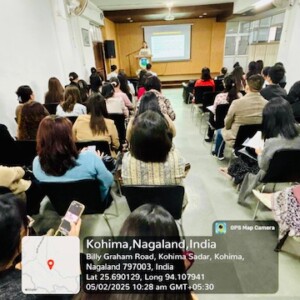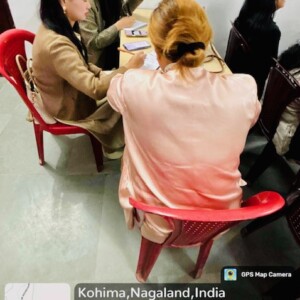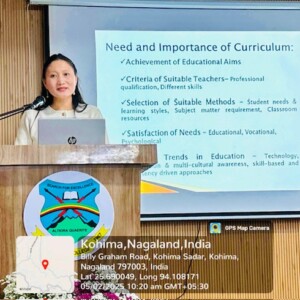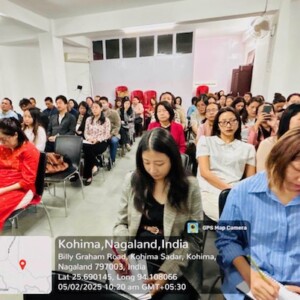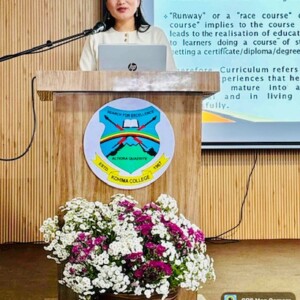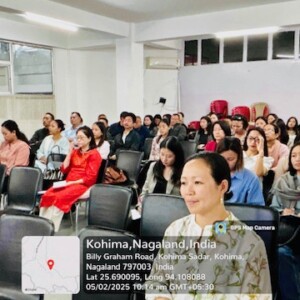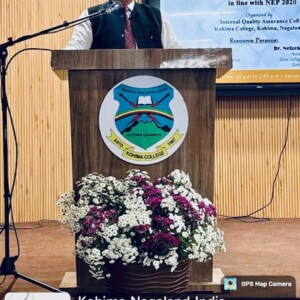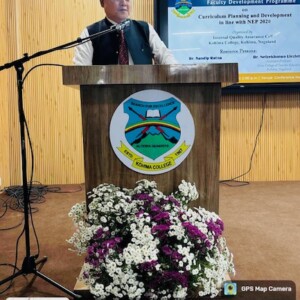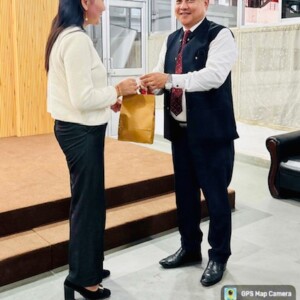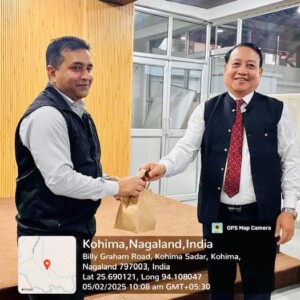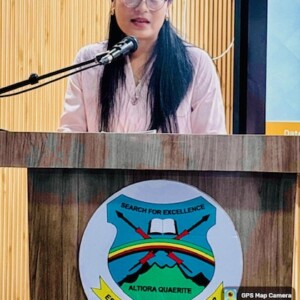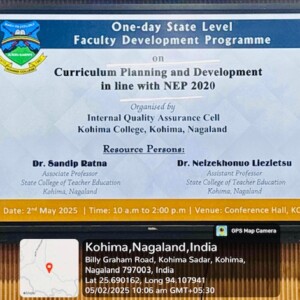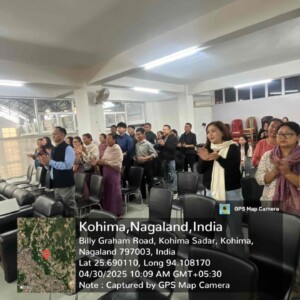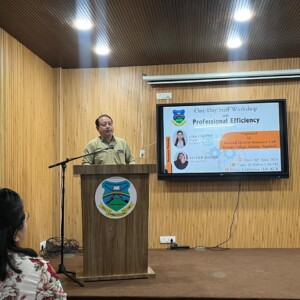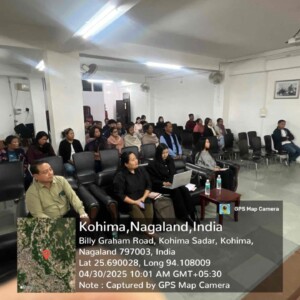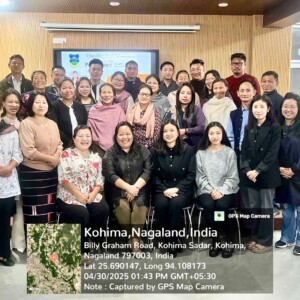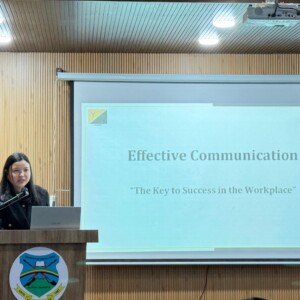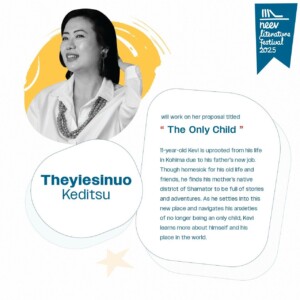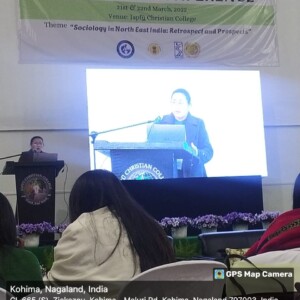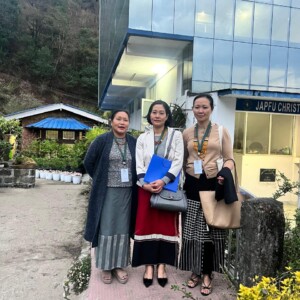December 3, 2025: Ireland, Empire and Nagaland: Kohima College Hosts Landmark International Lecture
Kohima College, Kohima, in collaboration with the Embassy of Ireland in India, hosted a landmark international public lecture titled “Ireland and the Empire”, transforming the college campus into a hub of historical inquiry, diplomacy, and cultural dialogue. The event, held as part of Ireland’s participation in the Hornbill Festival 2025, featured Professor Jane Ohlmeyer, one of Ireland’s most influential historians, and His Excellency Kevin Kelly, Ambassador of Ireland to India, Bangladesh, Nepal, Sri Lanka and the Maldives.
Principal Dr. Vitsosie Vupru described the occasion as “a red-letter day”—the first time Kohima College has collaborated directly with a foreign nation. He highlighted the college’s growth from modest beginnings as a night college in 1969 to a thriving institution offering ten undergraduate departments and two postgraduate programmes, with a current enrolment of 1,908—the highest among Nagaland’s government colleges.
He also announced a forthcoming reading workshop on James Joyce’s Dubliners, facilitated by Kaivalya Plays from New Delhi, organised jointly with the Embassy of Ireland.
Before the formal session, the Irish delegation engaged in a warm and lively interaction with the faculty. Ambassador Kelly was presented with an Angami traditional shawl, and Professor Ohlmeyer with a Chang women’s shawl, both of which they received with enthusiasm. Ohlmeyer remarked on her joy at finally visiting Nagaland, calling the state “a beautiful, beautiful place”.
Ambassador Kelly presented the college with a specially crafted Irish–Indian keepsake box, richly decorated with Celtic and literary symbols—among them the shamrock associated with St. Patrick and motifs reflecting Irish mythology and architecture. Inside the box were engraved brass plates bearing quotations from Irish literature. Professor Ohlmeyer gifted the college a signed copy of her book, Making Empire: Ireland, Imperialism, and the Early Modern World.
In his keynote remarks, Ambassador Kevin Kelly framed Ireland’s presence at Hornbill as part of a multi-layered engagement with Nagaland. Ireland’s cultural delegation includes the Irish band Bóinn, a theatre collaboration connected to the upcoming Joyce workshop, and “Danu”, a 16-foot Celtic goddess statue created by artists from Kolkata and Galway.
Kelly spoke candidly and movingly about Ireland’s own long struggle with colonialism, violence and partition, drawing striking parallels with the historical experiences of Northeast India. Recalling his childhood in Northern Ireland during the height of sectarian conflict, he described neighbourhoods divided by identity, daily threats of bombings, and communities torn apart by competing nationalisms. The 1998 Good Friday Agreement, he explained, transformed this reality—not by erasing political differences, but by creating a framework for peaceful coexistence and dual identities.
“The peace agreement is not perfect,” he said, “but it remains one of the world’s most successful examples of negotiated peace.”
Kelly highlighted the relevance of this experience to Nagaland, praising Naga civil society and leaders for their commitment to peaceful dialogue and unity across tribal and national borders. He noted that Ireland, too, grapples with the ongoing legacies of partition and complicated relations with the United Kingdom, especially in the post-Brexit era.
With characteristic warmth and humour, Kelly ended his speech by offering a greeting in Irish, before thanking the audience for what he described as “one of the warmest welcomes I have ever received.”
Moderator Dr. Eunice Alinger, Associate Professor of History, introduced Professor Ohlmeyer, detailing her prolific academic career—13 books, more than €22 million in research grants, leadership roles at Trinity College Dublin, and her pioneering work on the 1641 Depositions. Calling her one of the foremost scholars on Ireland and Empire, Dr. Alinger emphasised her ability to make complex histories accessible to global audiences.
Professor Ohlmeyer delivered an engaging and incisive lecture that mapped Ireland’s long, troubled, and often contradictory relationship with empire. Speaking without notes, she traced Ireland’s role across four interconnected historical arcs:
1. Ireland as England’s first colony
Ohlmeyer explained how colonisation of Ireland from the 12th to 17th centuries involved not only military conquest but cultural transformation—imposing English language, religion, legal systems and economic structures. She compared these processes to later British policies in India, noting that many imperial strategies were first tested in Ireland.
2. Ireland as a “laboratory of empire”
She discussed early racial hierarchies articulated by figures like Gerald of Wales and Edmund Spenser, whose depictions of the Irish as “barbarous” or “uncivilised” laid foundations for later imperial ideologies. Similar language would later be used to demean colonised peoples elsewhere, including in India.
3. Irish participation in making empire
Many Irishmen—both Protestant and Catholic—served as administrators, soldiers, surveyors and civil servants across the British Empire. She highlighted Gerald Aungier, an early governor of Bombay, and the disproportionately Irish presence in the British Army in India by the 19th century. Even ordinary Irish soldiers and women left their traces in graveyards from Delhi to Mumbai.
4. Irish contributions to unmaking empire
Irish nationalists deeply influenced Indian freedom fighters. Figures such as Charles Stewart Parnell, Michael Davitt, Dadabhai Naoroji, Annie Besant, Maud Gonne, and Rabindranath Tagore formed vibrant intellectual circuits. The Easter Rising of 1916 inspired the Chittagong uprising, and Irish hunger-strike tactics were mirrored in India.
Ohlmeyer concluded with reflections on memory, amnesia and responsibility. She noted that while Ireland often views itself purely as a victim of empire, Irish individuals also participated in colonial violence—including key roles in events like the Jallianwala Bagh massacre.
The Q&A saw students raise probing questions about colonial trauma, peace-building, racial violence and brain drain. Ambassador Kelly addressed recent racist attacks on Indians in Ireland, acknowledging them as “horrific” but emphasising that Ireland strongly values its Indian community and has taken decisive measures to protect them. Ohlmeyer added that scholars speaking against racism often face online harassment, but must persist in shaping inclusive narratives.
In her closing remarks, Dr. Alinger emphasised that Irish and Indian histories are “entangled rather than isolated.” Professor Ohlmeyer expressed hope that this event marks the beginning of long-term partnerships in research, education and culture.
The programme concluded with a photo session and a luncheon for the delegates.
For Kohima College, the day stood as a milestone—one that opened a meaningful bridge between Nagaland and Ireland, built on shared histories, honest conversations, and the promise of future collaboration.
September 30, 2025: Completion of Minor Research Project on the topic “Voting Behaviour of Undergraduate Students in Students’ Elections: An Interdisciplinary Case Study of Kohima District (2024-2025)”
The members of the research team are as follows:
Principal Investigator: Dr Medongulie Zatsu, Department of Economics
Co-PI: Lashili G Chishi, Department of Political Science
Co-PI: Aosangla Longkumer, Department of Sociology
October 7, 2025: Two Kohima College Faculty Presentations at the National Seminar on “Tribals as Custodians of Traditions: Exploring the Naga Indigenous System”, Organised by ICFAI University, Chumukedima, Funded by ICSSR, New Delhi
Dr Ketoukhrieü, Department of Political Science and Dr Atazo Lohe, Department of History, both Assistant Professors from Kohima College, presented their research papers at the National Seminar themed, “Tribals as Custodians of traditions: Exploring the Naga Indigenous Knowledge System”. It was organised by ICFAI university, Chumukedima on 6th and 7th October 2025 & funded by ICSSR, New Delhi
September 30, 2025: Kohima College Congratulates Dr Konei Nakhro, Associate Professor, Department of Political Science & Dr Petevino Chase, Department of Environmental Science, Kohima College for the latest publication of their research findings
Kohima College, Kohima, proudly extends its heartfelt congratulations to Dr. Konei Nakhro and Dr. Petevino Chase on the successful publication of their latest research work. This remarkable achievement stands as a testament to their dedication to academic excellence, commitment to advancing knowledge, and contribution to the scholarly community.
September 20, 2025: One Day State-level Seminar organised by IQAC & Research & Development Cell, Kohima College
Kohima College organised & hosted a one-day state-level seminar on the theme “Role of Interdisciplinary Research in Higher Education Institutions to Achieve Sustainable Development Goals.” Funded by the Department of Higher Education, Government of Nagaland, and organised by the college’s IQAC and Research & Development Cell, the event brought together faculty, researchers and students from Kohima Science College, St. Joseph’s College (Jakama), and several other institutions across the State.
The programme opened with welcoming remarks from Chairperson Dr. Eunice Alinger (Associate Professor, History, RDC, KCK), and invocation by Ms. T. Shancholo Khuvung . Dr. Alinger thanked the Department of Higher Education for its support and described the seminar as the culmination of a major initiative to promote faculty development through research funding. Tokens of appreciation were presented to distinguished guests, including Dr. K. Nishena Nekha (Additional Director, Higher Education), keynote speaker Dr. I. Anungla Aier (Former Director, Higher Education), and Principal Dr. Vitsosie Vupru.
In his welcome address, Principal Dr. Vitsosie Vupru framed research as central to institutional growth and urged presenters to translate their projects into publications and policy-relevant outputs. He thanked the Department of Higher Education for providing the platform and financial support that enabled the seminar.
Dr. K. Nishena Nekha outlined the grant rationale, emphasising the transformative potential of faculty research and the Department’s aim to widen research participation. Acknowledging practical hurdles such as funding and competing duties, Dr. Nekha argued that research is accessible and essential: “Everybody can do something,” he said, calling for interdisciplinary teams to address complex state challenges like rural–urban migration, biodiversity management and climate adaptation.
Keynote speaker Dr. I. Anungla Aier delivered a wide-ranging address that positioned interdisciplinary research as necessary – not optional -for tackling multifaceted development problems. Drawing on her experience in multi-disciplinary projects, Dr. Aier stressed problem-focus, integration of knowledge, and the need to translate research into implementable policies. She highlighted priority areas for Nagaland, including urban planning, disaster resilience, ageing populations, and curriculum development that integrates traditional knowledge.
Technical Session I (chair: Dr. Medongunuo Ngone) featured applied science and modelling papers on thermoelectric materials, electrical resistivity surveys for Kohima town, mixed convection flow studies, and hydrologic basin modelling for Kohima district — all with local planning implications.
Technical Session II (chair: Dr. Prescilla Ezong) showcased work on museum digitisation, cricket rearing for livelihoods, sequencing of chickpea-nodulating rhizobia, studies of traditional Angami architecture, and social research on social media’s effects on student wellbeing and performance.
Closing remarks by Dr. Kekhrieseno Christina (HoD, Sociology & Director, RDC) reiterated the need to institutionalise interdisciplinary collaboration. Certificates were distributed and the seminar ended with a communal lunch.
The event underscored a growing research culture in Nagaland’s higher education sector: with targeted funding and cross-disciplinary collaboration, institutions are positioning themselves to produce locally relevant, actionable research that can inform state policy and sustainable development initiatives.
June 21, 2025: Kohima College Institutional Seminar
Kohima College, Kohima, successfully conducted its Institutional Seminar 2025 at the college’s Conference Hall. The seminar was organised by the Research and Development Cell, Kohima College, and brought together faculty researchers from various departments who presented papers on diverse themes ranging from ecofeminism to traditional architecture, digital behaviour, political identity, and indigenous language.
The seminar was chaired by Dr. Eunice Alinger, Assoc. Prof. Dept of History, who delivered the opening remarks. She highlighted the increasing importance of research and academic publications in the academic ecosystem, underlining how such platforms help strengthen knowledge, innovation, and scholarly collaboration within institutions.
The first paper was jointly presented by Dr. Limayangla Pongener and Diezenuo Tase, Asst. Professors from the Department of English. Their paper, titled “Eco-Feminism in Folklore about Nature, Foraging and Agriculture among the Angami Women of Kohima Village”, explored the intersection of ecology, gender, and justice. Drawing from folklore, myth, and lived experiences, the presentation aimed to critique patriarchal and capitalist systems while promoting sustainability, equity, and cultural heritage through literature and storytelling.
The second presentation was delivered by Megosie-ü Khate, a member of the Minor Project Team A, funded by the Department of Higher Education. Her paper, titled “Traditional Angami Architecture: A Study of Change and Continuity,” examined the architectural heritage of the Angami Nagas. The study aimed to identify, document, and understand the significance and functionality of traditional structures, the driving forces behind architectural changes, and the resulting impact on contemporary Angami communities.
Next, Dr. Evothung Ezung, Assoc. Prof, Department of Economics and Principal Investigator of Minor Project Team B(also funded by the Department of Higher Education), presented apaper on “The Impact of Social Media on the Academic Performance, Mental Health, and Social Behaviour of College Students in Nagaland.” The study revealed the double-edged nature of social media—while it serves as a useful academic resource and a tool for connectivity, it also poses challenges such as distraction, addiction, and adverse mental health effects among students.
Aosangla Longkumer, Asst. Prof., Dept of Sociology, presented a research paper titled “Voting Behaviour of Undergraduate Students in Students’ Election: An Interdisciplinary Case Study of Kohima District 2024–2025.” This paper was part of an inter-departmental project and delved into the complex nature of student voting behaviour. It revealed how personal values, peer networks, and socio-political identities shape students’ engagement in electoral processes and stressed the importance of connecting democratic ideals to students’ lived realities within academic institutions.
Mhasivilie Zhale, Assoc. Prof, Department of Tenyidie, with his paper “Popular Idioms Related to Hunting of Wild Animals and Birds in Tenyidie.” His study showcased the depth and beauty of the Tenyidie language through idiomatic expressions, particularly those related to hunting. Zhale highlighted how the usage of such idioms reflects wisdom, sharpens communication, and reinforces cultural identity. He urged for the preservation and promotion of indigenous languages and expressions that encapsulate traditional knowledge systems.
Lona Katiry, Asst. Prof, Department of Education, presented a thought-provoking paper titled “Understanding Work-Life Balance and the Influence of Hobbies as an Important Component.” Her research underlined the positive influence of hobbies on mental well-being, stress reduction, social interaction, and personal development, encouraging individuals to view hobbies as essential to holistic living rather than mere pastimes.
Concluding the day’s presentation was Dr. Ketoukhrieü, Assistant Professor, Department of Political Science, presented a paper titled “The Politics of Recognition: A Brief Political History of Identity Assertion among the Tikhir Nagas.” This paper, drawn from her ongoing ICSSR Major Research Project titled “Living at the Periphery: Territory, Culture and Identity of the Tikhir Nagas, a scheduled tribe in Nagaland near the Indo- Myanmar Border”, investigated the assertion of a distinct tribal identity. Her research focused on the political processes behind recognition and identity formation among the Tikhirs and their negotiation through state structures and ethnic dynamics.
The 2025 Institutional Seminar at Kohima College stood out as a dynamic platform fostering academic exchange, interdisciplinary research, and the celebration of indigenous wisdom. Each presentation not only contributed to knowledge building but also highlighted the rich socio-cultural landscape of Nagaland, demonstrating the College’s commitment to both global academic standards and local relevance.
June 11-12, 2025: Dr Ketoukhrieü participated at the National Seminar on “Border Dynamics in Northeast India: Challenges, Opportunities & Policy Imperatives”, Baptist College, Kohima
Dr. Ketoukhrie-ü, Assistant Professor, Department of Political Science and IQAC Coordinator at Kohima College, actively participated in the National Seminar on Border Dynamics in Northeast India: Challenges, Opportunities and Policy Imperatives held from 11th to 12th June 2025 at Baptist College, Kohima.
The seminar was organised by the Research and Development Cell, Baptist College, Kohima, in collaboration with the Department of History and Archaeology, Nagaland University. Dr. Ketoukhrie-ü was a distinguished member of the panel discussion on “Border Dynamics in Northeast India: Challenges, Opportunities and Policy Imperatives”.
In addition to her participation in the panel, she also presented a research paper titled “Borderlands as Homelands: Amplifying Indigenous Voices in the Indo-Myanmar Borderlands”, where she highlighted the critical role of indigenous narratives in shaping borderland discourse and policy considerations.
Her contributions added valuable perspectives to the seminar’s interdisciplinary engagement with border issues in Northeast India.
May 31, 2025: Completion of Minor Research Project on “A Study Examining the Impact of Social Media on the Academic Performance, Mental Health and Social Behaviour of College Students in Nagaland”, funded by the Department of Higher Education, GoN, Kohima, Nagaland
The Minor Research Project titled “A Study Examining the Impact of Social Media on the Academic Performance, Mental Health and Social Behaviour of College Students in Nagaland” has been completed under the principal investigator, Dr Evothung Ezung, Associate Professor, Department of Economics, Kohima College. Funded by the Directorate of Higher Education, Govt. Of Nagaland, it was closely monitored by the IQAC (Internal Quality Assurance Cell), Kohima College.
The research team was composed of a interdisciplinary set of Co-Principal Investigators namely: Dr Eunice Alinger, Associate Professor (Department of History), Dr Purlemla Longkumer, Assistant Professor (Department of Sociology), Lona Katiry, Assistant Professor (Department of Education) & Lashili G Chishi, Assistant Professor (Department of Political Science).
The College fraternity expressed heartfelt appreciation for the team’s dedication & their timely submission to the IQAC Coordinator and the Principal, Kohima College.
May 30, 2025: Minor Project on “Traditional Angami Architecture: A Study of Continuity & Change”
The Kohima college family extends heartfelt congratulations to the research team on the successful completion of the Minor Research Project titled “Traditional Angami Architecture: A Study of Continuity and Change.” This significant academic endeavor, sponsored by the Department of Higher Education, Government of Nagaland, and diligently monitored by the Internal Quality Assurance Cell (IQAC) of Kohima College, Kohima, stands as a testament to the commitment, scholarship, and collaborative spirit of our faculty members.
The project, led by Dr. Kekhrieseno Christina, Associate Professor, Department of Sociology (Principal Investigator), has been a commendable interdisciplinary effort. She was ably supported by an outstanding team of Co-Principal Investigators:
Dr. Konei Nakhro, Associate Professor, Department of Political Science
Dr. Petevino Chase, Assistant Professor, Department of Environmental Science
Ms. Sungjemienla, Associate Professor, Department of English
Ms. Megosieu Khate, Librarian, Kohima College
We express our sincere appreciation to the team for their hard work and for submitting the final report to the IQAC Coordinator and the Principal, Kohima College, Kohima. Your efforts have brought honor to the institution and added value to the academic community at large.
May 2, 2025: One-Day State-Level FDP 2025 on “Curriculum Planning & Development in line with NEP 2020”
Kohima College, Kohima, successfully hosted a one-day State-Level Faculty Development Programme (FDP) on the theme “Curriculum Planning and Development in Line with NEP 2020” with 74 participants from across different districts of Nagaland. The programme, organised by the Internal Quality Assurance Cell (IQAC), brought together 82 participants from various higher education institutions across the state to engage in meaningful dialogue on curriculum transformation in line with the National Education Policy 2020.
The event commenced with the Chairperson’s address by Dr. Ziuziu Iheilung, Assistant Professor of Functional English, who offered a contextual explanation of the National Education Policy 2020. He emphasized that NEP is a transformative and evolving policy that seeks to redefine the Indian education system by focusing on inclusive, flexible, and forward-looking academic frameworks.
In his welcome note, the Principal of Kohima College, Dr. Vitsosie Vupfu, described NEP 2020 as a dynamic educational reform adopted in 2020, which continues to evolve and adapt. He highlighted the importance the policy places on reviving and integrating the Indian Knowledge System (IKS) and stressed the need for producing knowledge rooted in indigenous traditions and the local context of the state. He pointed out that with limited common-pool resources, collective academic contributions are necessary for the upliftment of higher education, not just for individual benefit but for the advancement of the college and university system as a whole. Such efforts, he added, will enrich students’ knowledge bases and elevate institutional standards—a true win-win situation. He expressed confidence that the FDP would play a key role in helping faculty shape curriculum ideas and equip themselves better, wishing all participants success in the programme.
The first technical session was delivered by Dr. Neizekhonuo Liezietsu, Assistant Professor at the State College of Teacher Education, Kohima. She explored the concept of curriculum as a comprehensive set of learning experiences designed to achieve specific educational goals. She spoke in detail about the need and significance of curriculum, elaborating on various foundational principles such as learner-centric approaches, psychological and logical sequencing, and the importance of flexibility, creativity, and utility. Dr. Liezietsu walked the participants through the curriculum development process, explaining each phase—planning, design, development, implementation, and evaluation. She emphasized that curriculum development is not a static process but a structured and dynamic one that plays a vital role in shaping the educational experience and ensuring that students are equipped with relevant knowledge and skills.
In the second technical session, Dr. Sandip Ratna, Associate Professor at the State College of Teacher Education, Kohima, offered an in-depth presentation on course design for the Four-Year Undergraduate Programme (FYUGP) as envisioned by NEP 2020. He began by comparing the previous academic system with the new structure and provided an overview of key developments introduced in NEP 2020, the Curriculum and Credit Framework for Undergraduate Programmes (CCFYP 2022), and the FYUGP 2023. He explained the shift from marks to credits and grades, and clarified the distinction between major, minor, and elective subjects. Dr. Ratna also discussed credit requirements, program structures, subject choices, and offered examples of course design under FYUGP.
Concluding his session, he offered insightful recommendations tailored to institutions, students, and policymakers. For institutions, he emphasized the importance of clear academic advising and building research guidance capacity at the undergraduate level. To students, he advised beginning with an open mind, exploring interdisciplinary electives, and planning early for research or dual majors, while also utilizing exit options strategically in case of financial or personal constraints. For policymakers, he recommended support for credit transfer, recognition of prior learning, and greater encouragement for collaborative projects, internships, and community-based learning as part of credit-bearing courses.
The event concluded with a vote of thanks by Dr. Theyiesinuo Keditsu, Assistant Professor in the Department of English. All participants received FDP kits and certificates. The programme was well-received and applauded as a timely initiative to equip educators with the tools and understanding necessary to implement NEP 2020’s ambitious academic reforms effectively.
April 30, 2025: One-Day Workshop on “ Professional Efficiency for Ministerial & Non-Teaching Staff, focusing on Improving Workplace Communication, Ethics, Teamwork & Time-Management”
The Internal Quality Assurance Cell (IQAC) of Kohima College, Kohima, organized a one-day workshop on Professional Efficiency for ministerial and non-teaching staff, focusing on improving workplace communication, ethics, teamwork, and time management.
The workshop began with a welcome message from Dr. Ketoukhrie-ü, IQAC Coordinator, who encouraged staff to work together as a family and strive for excellence. She emphasized that the success of the college has come through years of dedication and that such initiatives aim to refresh and uplift staff performance.
The Principal of Kohima College , Dr Vitsosie Vupru, extended appreciation to YouthNet, the training partner, for their consistent efforts in uplifting Naga society. Addressing the staff, he emphasized that no role is too small and highlighted the importance of improving every aspect of college functioning. “There’s always room for improvement,” he stated, affirming the shared responsibility in building institutional success.
An ice-breaker activity by Kelhouwenuo Riipreo- , Programme Facilitator of YouthNet set a participatory tone, leading into a series of sessions facilitated by Lika Chophy and Esther Angami.
The session on Effective Communication explored verbal and non-verbal methods, common barriers, and techniques like active listening and constructive feedback. A round of Chinese Whispers demonstrated the impact of miscommunication.
In Proactive Ownership, staff reflected on accountability and were introduced to a 30-day test to evaluate their proactive behaviors.
The Teamwork session featured group activities and addressed building successful teams through clear roles, trust, and communication.
Work Ethics emphasized punctuality, accountability, and professionalism as essential workplace values, while Time Management introduced the Eisenhower Matrix to help staff prioritize and plan effectively.
The workshop concluded with a Vote of Thanks by Kewetshupe Lohe, Senior Head Assistant.
22 April, 2025: Dr Theyienuo Keditsu, recipient of the Neev Literature Festival 2025
Dr. Theyiesinuo Keditsu, Assistant Professor, English Department, Kohima College Kohima, Nagaland has won the Neev Literature Festival Fellowship for the year 2025. This writing fellowship is awarded to writers of children’s books . Dr. Keditsu will be working on her proposal “The Only Child” for this fellowship, which carries an amount of 6,00,000/-.
21-22, March, 2025: Dr Kekhrieseno Christina, Dr Konei Nakhro & Dr Petevino Chase presented a paper on “Exploring Indigenous Angami Architectural Heritage”
Report on attending the 1st annual conference of the Sociological Association of North-East India (SANEI).
The theme of the conference was, “Sociology in Nort-East India: Retrospect and Prospects”. The conference was held from 21st to 22nd March 2025 at Japfü Christian College (JCC) Kigwema, sponsored by the North-East Council (NEC). A paper on “Exploring Indigenous Angami Architectural Heritage” was presented by Dr. Kekhrieseno Christina, Dr. Konei Nakhro. and Dr. Petevino Chase from Kohima College, Kohima. Dr. Kekhrieseno Christina was also a rapporteur for five sessions.

